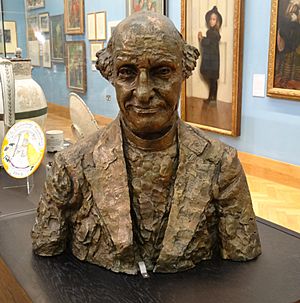Hewlett Johnson facts for kids

Hewlett Johnson (born January 25, 1874 – died October 22, 1966) was an English priest. He was a leader in the Church of England. He became known as the "Red Dean of Canterbury." This nickname came from his strong support for the Soviet Union and its allies.
Contents
Early Life and Beliefs
Hewlett Johnson was born in Kersal, England. His father was Charles Johnson, a wire maker. Hewlett studied civil engineering at Owens College, Manchester. He graduated in 1894.
From 1895 to 1898, he worked at a railway factory. There, he learned about socialism from his co-workers. Socialism is a political idea about sharing wealth and resources. He then decided to become a priest. He studied theology at Wadham College, Oxford. He became a priest in 1904.
In 1908, he became the vicar of St Margaret's in Altrincham. He and his first wife helped poor children. They also set up a hospital for wounded soldiers during World War I. Johnson had unusual views about the war. He was not allowed to be an army chaplain. But he did work at a prisoner-of-war camp.
Johnson believed in a mix of Christian faith and Marxist ideas. Marxism is a political and economic theory. Because of his views, the British secret service (MI5) watched him from 1917. He never joined the Communist Party of Great Britain. But he became chairman of the board for their newspaper, The Daily Worker.
Even though his political views were not popular, he worked very hard. In 1924, he became the Dean of Manchester. A dean is a senior leader in a cathedral. He was appointed by Ramsay MacDonald, who founded the Labour Party. In 1931, Johnson became the Dean of Canterbury. This is a very important position in the Church of England.
The Socialist Sixth of the World
Johnson became famous in the 1930s. He often compared the Soviet Union's growth to Britain's struggles. Britain was going through the Great Depression then. This was a time when many people lost jobs and money.
He visited the Soviet Union in 1934 and 1937. He claimed that people there were healthy and wealthy. He also said the Soviet system protected people's freedoms. He wrote a book called The Socialist Sixth of the World in 1939. In this book, he shared his positive views. He said he had traveled widely in the Soviet Union. He claimed he saw all parts of towns and villages. Later, it was found that parts of his book were copied. They came from pro-Soviet materials.
World War II and Soviet Ties
During World War II, Johnson followed the Soviet Union's political ideas closely. In 1939, the Soviet Union and Nazi Germany signed an agreement. It was called the Molotov-Ribbentrop pact. After this, Johnson was against Britain's war effort. He was accused of spreading ideas that made people lose hope.
However, in 1941, Nazi Germany attacked the Soviet Union. This was called Operation Barbarossa. After this, Johnson supported the war. But the secret service still thought it was "undesirable" for him to speak to soldiers.
Johnson was one of the church leaders who convinced Joseph Stalin to bring back the Moscow Patriarchate. This was the main church leadership in Russia. Stalin agreed because it helped his relations with Western countries.
After the War
After the war, Johnson received awards from the Soviet Union. These included the Order of the Red Banner of Labour and the Stalin International Peace Prize. He kept using his public role to support the Soviet Union. From 1948, he led the British-Soviet Friendship Organisation.
However, public support for the Soviets in Britain went down. This happened especially after the Soviet Union sent troops into Hungary in 1956. Johnson's pro-communist actions caused problems for the British government. Foreigners sometimes confused him with the Archbishop of Canterbury.
Critics said Johnson didn't deeply study the issues he spoke about. These included famines in the 1930s and claims of germ warfare in Korea.
At the King's School, Canterbury, the headmaster, Fred Shirley, disagreed with Johnson. One year, Johnson put up a banner that said "Christians Ban Nuclear Weapons." In response, some students put up a banner saying "King's Ban Communists."
Some people called Johnson's ideas of mixing Christianity and Marxism "heretical." This means going against accepted religious beliefs. But Johnson said he knew the difference between religion and politics. He believed that capitalism lacked a moral basis. He felt that communism had a strong moral appeal.
His biographer, Natalie E. Watson, wrote about him. She said Johnson saw communism as a natural result of the Christian gospel. She noted that his writings on Soviet Russia were "naive and romantic." He ignored the harsh realities of mass persecution and anti-religious actions.
Personal Life
Hewlett Johnson was married twice. In 1903, he married Mary Taylor. They did not have any children. Mary died in 1931. In 1938, he married Nowell Mary Edwards. They had two daughters together.
Later Years
Johnson retired as Dean of Canterbury in 1963. He was 89 years old. He stayed in Canterbury. He continued to follow communist world events. He also became interested in psychical research. This is the study of things like telepathy. He finished his autobiography, Searching for Light, before he died. It was published in 1968.
Hewlett Johnson died in 1966 at age 92. He was buried at Canterbury Cathedral.
Published Works
- The Socialist Sixth of the World, 1939
- The Secrets of Soviet Strength, 1943
- Soviet Russia since the war, 1947
- China's New Creative Age, 1953
- Eastern Europe in the Socialist World, 1955
- Christians and Communism, 1956
- The Upsurge of China, 1961
- Searching for Light (autobiography), 1968 (published after his death)
Images for kids
 | Sharif Bey |
 | Hale Woodruff |
 | Richmond Barthé |
 | Purvis Young |


